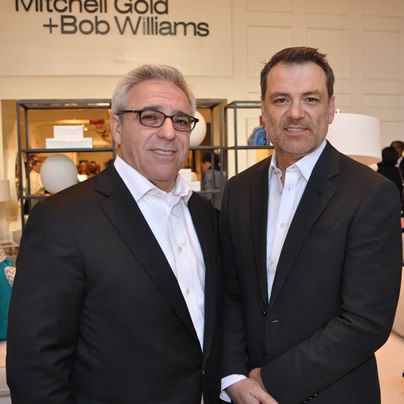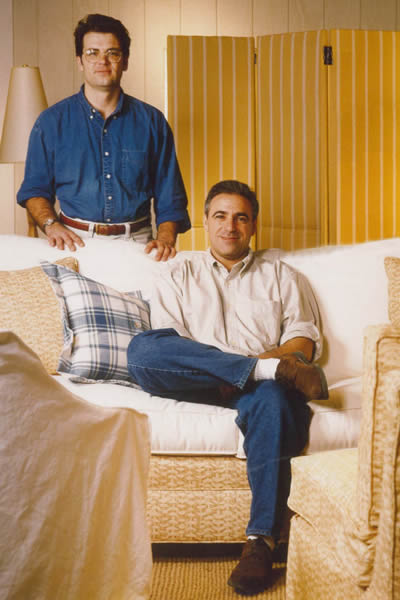Arts & Entertainment
Celebrating silver in style
Gay-owned furniture company Mitchell Gold + Bob Williams marks milestone


Mitchell Gold (left) and business partner Bob Williams at their Washington store for an event in 2013. (Washington Blade file photo by
Mitchell Gold + Bob Williams
25th anniversary event
A benefit for Sitar Arts Center
Wednesday
6-9 p.m.
Mitchell Gold + Bob Williams Washington location
1526 14th St., N.W.
mgbwhome.com
RSVP requested
202-332-3433
Mitchell Gold and Bob Williams, co-owners of the eponymous furniture company, didn’t originally intend for their company to be as big as it is today.
Gold says they were originally thinking of a modest business model in which they’d work four days a week, have a small stable of customers and do about $5 million a year in sales.
“We didn’t have to make that much money,” Gold says. “It was just the two of us living down South, it’s much less expensive to live here, and we thought we would just have this nice little company. … But as Bob often tells people, ‘It’s not that Mitchell lied — it’s just that he can’t count.’”
Started in 1989 with about $60,000, things took off rather quickly. They sold about 800 dining tables and 5,000 chairs before they started making any of the pieces. Gold, who’d been fired from the furniture company he’d worked for, had connections with major retailers like J.C. Penney, Crate & Barrel and others, which he visited armed with sketches and fabrics Williams had made. They were profitable the first year they were in business.
“We had fabrics that were different and unusual for the time,” Gold says. “So we were able to show retailers, ‘This is how this will look in your store.’ And they bought it right away. People have said I’m not a bad salesman, so I was able to close the sales and get the production going quickly.”
The two, who’d been together as domestic partners about two years before, had moved to Hickory, N.C., from New York and were interested in going into business together.
“We just thought we could do it better than traditional manufacturers,” Gold says. “We thought we could make a better commitment to customers, ship it more quickly and with Bob’s sense of style, you know, I certainly felt we could offer people a more stylish look for a better price.”
Williams worked for a small ad agency and gradually cut back his time there as he spent more and more with the company, then known as the Mitchell Gold Company (it was changed to its present name in 2002).
Now they’re celebrating 25 years and have more than 700 employees, a stable of celebrity clients, 17 stores and plans to open four more by year’s end and a 600,000-square-foot factory and home base in Taylorsville, N.C.
Several spoke at a company event two weeks ago where 11 of their original 21 employees who are still with the company were recognized. It appears, from a transcript of comments, that morale there is strong.
Ken Hipp, the company’s senior vice president of retail stores and merchandising, has been with them for seven years and calls Gold and Williams “wonderful mentors.”
“It’s been quite a ride,” says Hipp, who’s also gay. “I can’t imagine my career or my life without them.”
Known for a style they call “quintessentially American,” their products are designed to be stylish, yet comfortable. Interior designer Brian Patrick Flynn of TBS’s “Movie & a Makeover” show has called their products “custom-looking pieces at medium-to-high price-points” and says it’s a “genius brand” he and his clients “can’t get enough of.”
On Wednesday, the two will be in town for an event at their D.C. store at 1526 14th St., N.W., an anniversary event that will benefit the Sitar Arts Center. It’s one of a series of events they’re having at their various locations throughout the year.
In a country where just 25 percent of new employer firms are still in business 15 years or more after starting according to the Small Business Administration, theirs is a nearly unfettered success story.
It hasn’t all been easy going, though. Williams remembers many long hours in the early years, though he also says those were some of the most “exhilarating times of my life.”
They recall years of working what felt like round-the-clock schedules and didn’t take a vacation until two years into it, but were gratified by strong out-of-the-gate sales.
“Customers liked what we were doing immediately,” Williams says. “We never had to go call on people. The more they heard about us, the more we had people wanting to buy from us.”
They broke up on the personal side about 12 years into the business, though they’re wholly comfortable working together and are each married and have been with other men for years — Gold has been with Tim Gold for seven years; Williams has been with Stephen Heavner for 11 years.
Might their relationship have lasted if it weren’t for the company? It’s a thorny question they don’t wish to dwell on.
“We don’t give much thought to it,” Williams says.
“It takes a lot of time and energy to go back and visit the past,” Gold says. “We’re more focused on the future.”
They acknowledge there were “a few little awkward moments, but not too much,” as Gold says. Keeping the company strong was chief among their priorities as always, they say.
The only time they had any significant downsizing was in 2008. Gold says it was a hard, but at the time necessary, decision in the face of a huge recession.
The company prides itself on the health care package it offers, on-site day care and cafeteria and unabashed LGBT advocacy work.
They say providing such amenities pays off in the long run.
“I think what we have proven is that you can be profitable and do the right thing,” he says. “When you have people who aren’t sick, they’re being more productive and that makes things more profitable. With our day care, if little junior has a problem, somebody goes and takes care of it and is back in 15 or 20 minutes, not the three hours it would take to go across town.”
They guess about 15 percent of their employees are also LGBT and estimate between 15-20 percent of their clientele is as well. Gold says it’s “certainly higher than other furniture retailers.”
Gold, who wrote a book called “Crisis: 40 Stories Revealing the Personal, Social and Religious Pain and Trauma of Growing up Gay in America” in 2008, says being open about such things is a central component to the company.
He relishes telling of a celebration dinner they had with loan officers after paying back a $25 million loan they’d used to expand. Several of the bank execs told him how reading “Crisis” had given them new compassion for LGBT issues, from one man who stepped up his giving at a homeless shelter to another whose wife came out.
“One by one, they went around the table and told us how much our advocacy work had meant to them,” Gold says.
Coming from a staid banking environment, Hipp says finding a place he could be out on the job was a revelation.
“I thought I loved banking but I realized banking did not love me,” he says. “I was very uncomfortable and very conflicted over my future and I was met with some very harsh realities. I could not believe that someone of my age, I was in my early 20s at the time, could actually go to work someplace where it was OK for me to be who I was. I didn’t have to tuck any part of myself under my sleeve. I could actually say that I was gay and it didn’t matter. … I was just a kid from the south and I thought that was the best it would get.”
Some of the 25th anniversary events will benefit LGBT and AIDS causes. Gold next plans an open letter to the Pope urging him to change Vatican teaching that homosexuality is sinful behavior.
“When you get down to it, that’s really the seminal reason why people think gay people should not have equality,” Gold says. “The whole issue of sin is really the crux of why people are against it.”
But has there been backlash or lost sales along the way?
“Our business just keeps going at such a pace that’s ahead of the industry with sales and growth and things like that,” he says. “You know, we can’t worry about the one or two people who aren’t going to buy from us because we’re gay and outspoken.”
Mitchell Gold and Bob Williams on:

Bob Williams (left) and Mitchell Gold in the early years of their business. (Photo courtesy of Mitchell Gold + Bob Williams)
• Their all-time favorite products:
GOLD: Leather club chairs they designed after spotting vintage pieces at a Paris flea market.
“If something sells that well and looks pretty, I sure do like it,” he says.
WILLIAMS: “Our slipcovers are great because they’re just so versatile — you can dress them up or down, change the style and they just give off this great ambience of relaxed, casual comfort.”
• How practical the whites and neutrals they use so often are for everyday
GOLD: “Today’s fabrics are a lot different from what you saw 20-30 years ago. They’re much friendlier to live with and stain resistant.” And if you spill red wine? “In a lot of the fabrics, yes, it will come out. But you have to get it quickly, not let it sit there a day.”
• Nate Berkus
GOLD: “We love Nate Berkus.”
WILLIAMS: “He has great hair.”
GOLD: “Yes, he has great hair, he’s cute and adorable and we’re fairly friendly with him. I like his work a lot.”
WILLIAMS: “His last book was great.”
• Thom Filicia (of “Queer Eye” fame)
GOLD: “Sweet guy and talented. We were at a design kind of home in South Hampton and his room was really a standout.”
• 2013 sales?
GOLD: “Over $100 million.”
• Lulu, the company mascot
GOLD: “She’s resting in peace. She was 12 and a half and she will be the mascot in perpetuity. The thing about bulldogs is once they decide on something, that’s it. They figure out a way to get it. She came to work with us everyday and loved walking around and saying hi to everyone.”
Out & About
Plan your wedding the LGBTQ way
Washington D.C. LGBTQ+ Wedding Expo scheduled for Sunday

Rainbow Wedding Network will host “Washington D.C. LGBTQ+ Wedding Expo” on Sunday, March 1 at 12:30 p.m.
Guests can meet and mingle with a curated selection of LGBTQ-welcoming wedding professionals from across the region, each ready to help bring your vision to life, and spend a beautiful afternoon exploring everything they need to create a celebration that reflects them.
There will be a relaxed, self-guided look at the Watergate’s spaces and amenities, savor signature cocktails and delicious tasting samples, and connect with other couples who are on the same journey.
Visit Eventbrite to reserve a spot.

Friday, February 27
Center Aging Monthly Luncheon With Yoga and Drag Bingo will be at 12 p.m. at the DC Center for the LGBT Community. Email Mac at [email protected] if you require ASL interpreter assistance, have any dietary restrictions, or questions about this event.
Go Gay DC will host “LGBTQ+ Community Happy Hour Meetup” at 7 p.m. at Freddie’s Beach Bar and Restaurant. This is a chance to relax, make new friends, and enjoy happy hour specials at this classic retro venue. Attendance is free and more details are available on Eventbrite.
Trans Discussion Group will be at 7 p.m. on Zoom. This group is intended to provide an emotionally and physically safe space for trans people and those who may be questioning their gender identity/expression to join together in community and learn from one another. For more details, email [email protected].
Saturday, February 28
Go Gay DC will host “LGBTQ+ Community Brunch” at 11 a.m. at Freddie’s Beach Bar & Restaurant. This fun weekly event brings the DMV area LGBTQ+ community, including allies, together for delicious food and conversation. Attendance is free and more details are available on Eventbrite.
The DC Center for the LGBT Community will host “Sunday Supper on Saturday” at 2 p.m. It’s more than just an event; it’s an opportunity to step away from the busyness of life and invest in something meaningful, and enjoy delicious food, genuine laughter, and conversations that spark connection and inspiration. For more details, visit the Center’s website.
Black Lesbian Support Group will be at 1 p.m. on Zoom. This is a peer-led support group devoted to the joys and challenges of being a Black lesbian. You do not need to be a member of the Beta Kappa Chapter or the Beta Phi Omega Sorority in order to join, but they do ask that you either identify as a lesbian or are questioning that aspect of your identity.Send an email to [email protected] to receive the zoom link.
Sunday, March 1
LGBTQ+ Community Coffee and Conversation will be at 12 p.m. at As You Are. This event is for people looking to make more friends and meaningful connections in the LGBTQ community. Attendance is free and more details are available on Eventbrite.
Monday, March 2
“Center Aging: Monday Coffee Klatch” will be at 10 a.m. on Zoom. This is a social hour for older LGBTQ+ adults. Guests are encouraged to bring a beverage of choice. For more information, contact Adam ([email protected]).
Tuesday, March 3
Universal Pride Meeting will be at 7 p.m. on Zoom. This group seeks to support, educate, empower, and create change for people with disabilities. For more details, email [email protected].
Wednesday, March 4
Job Club will be at 6 p.m. on Zoom upon request. This is a weekly job support program to help job entrants and seekers, including the long-term unemployed, improve self-confidence, motivation, resilience and productivity for effective job searches and networking — allowing participants to move away from being merely “applicants” toward being “candidates.” For more information, email [email protected] or visit www.thedccenter.org/careers.
Center Aging Women’s Social and Discussion Group will be at 6 p.m. on Zoom. This group is a place where older LGBTQ+ women can meet and socialize with one another. There will be discussion, activities, and a chance for guests to share what they want future events to include. For more information, email [email protected].
Thursday, March 5
The DC Center’s Fresh Produce Program will be held all day at the DC Center for the LGBT Community. People will be informed on Wednesday at 5 p.m. if they are picked to receive a produce box. No proof of residency or income is required. For more information, email [email protected] or call 202-682-2245.
Virtual Yoga Class will be at 7 p.m. on Zoom. This free weekly class is a combination of yoga, breathwork and meditation that allows LGBTQ+ community members to continue their healing journey with somatic and mindfulness practices. For more details, visit the DC Center’s website.
a&e features
Transmission DC breathes new life into a storied sound space
A fresh home for boundary-pushing culture on H Street

Late last year, phoenix-style, a fresh home for boundary-pushing culture arose on the H Street corridor. Transmission DC – a queer, trans, and POC-owned, operated, and centered community-focused venue – powered on in the former home to the Rock & Roll Hotel (famously, not a hotel, but very much rock & roll). Transmission (1353 H St., N.E.) arrives secure in its mandate – or even birthright – to provide a place to celebrate creativity and music through a lens of inclusivity and respect.
Transmission’s team brings experience, but also representation. Owners/partners Kabir Khanna (who is also programming director), Katii B, Ellie McDyre, and Kelli Kerrigan together previously managed 618 productions, a venue in Chinatown, crafting “some of D.C.’s freakiest parties, raves, and mosh pits” they note.
They packed up operations last fall to a space curated specifically for D.C.’s underground music and culture scene, building their efforts in Chinatown to bring in more fans in queer and POC circles.
Transmission, Khanna points out, is built on DIY values. In the music scene, DIY means that promoters and organizers – often disconnected from the mainstream and part of marginalized communities – build shows and programs collaboratively, but independently from institutions, supporting each other as smaller, independent venues close. Here, Transmission aims to ensure that those putting together these underground inclusive shows have a more permanent and stable home, can have access to resources, and can provide more sustainable income to artists. “We’re trying to get more people to support and enjoy the music, and also give artists and organizers within the DIY community more structure and a larger cut,” says Khanna.
Khanna also notes that Transmission operates “under the principles of safety, inclusivity, and respect.” McDyre added that even at venues that claim inclusivity, that statement might not take place in practice. We’re “not just pitting up a rainbow flag,” says McDyre, but as some of the owners are trans and POC, audiences can see themselves reflected at the top.
Much like the DIY nature of the music community, the Transmission owners brought a DIY ethos to turning around their space.
In March 2020 – the height of COVID lockdowns – Rock & Roll Hotel suddenly shuttered, though not due to the pandemic; instead, the venue claimed that decreasing sales and increasing competition led to the closure. For 14 years, it was the central spot for cheap beer and lesser-known and celebrated acts. The space stood vacant for more than five years, until Transmission turned the power back on.
“When we got into the space, it was effectively abandoned for years,” says Khanna. “There was a ton of mold, and paint primer covering all surfaces. It was nearly falling apart.” Khanna noted that many music venues like this one, regardless of how well it was maintained, “get the shit kicked out of it,” given the nature of shows. The team called in mold removal contractors, ripped up most of the floorboards, and started fresh.
Transmission’s first floor is styled as a stripped-down black box: the better to take in the music. “It’s minimal on purpose to act as a canvas for set design and music,” without a specific aesthetic, says Khanna. Moving upstairs, the second floor has been opened up, removing some walls, and now has a larger dance area than the first floor. Beyond the first two performance levels, and a holdover from Rock & Roll Hotel, is the rooftop. Though without a stage, the rooftop space is filled with murals splashed across the walls, with a full bar. Transmission’s current capacity is 496, but the team is looking to grow that number. Transmission will also leverage the full kitchen that Rock & Roll Hotel operated, bringing in Third Hand Kitchen to offer a variety of food, including vegan and vegetarian options.
Khanna pointed out an upcoming show reflective of Transmission’s inclusive ethos: Black Techo Matters on Feb. 27. The event is set to be “a dynamic, collaborative night of underground electronic music celebrating Black History Month.” Khanna says that techno came from Black music origins, and this event will celebrate this genesis with a host of artists, including DJ Stingray 313, Carlos Souffront, and Femanyst.




















